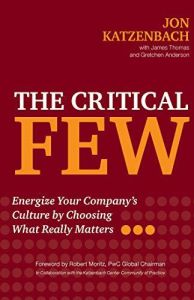
The Critical Few
Energize Your Company’s Culture by Choosing What Really Matters
Recommendation
If your company’s efforts to shift its culture have fallen short, strategic adviser Jon Katzenbach offers a solution. He and co-authors Gretchen Anderson and James Thomas provide a blueprint for seamlessly aligning your culture with your business goals. Traditional culture change plans often fail because they’re off-target and overly complex. To avoid stumbling, focus on three critical emotional aspects of culture: “traits, keystone behaviors and authentic informal leaders.” Katzenbach’s formula derives from more than 40 years in consulting. His insights prove a valuable resource for guiding your organization through its journey of transformation.
Summary
About the Authors
Jon Katzenbach is founder of the Katzenbach Center at Strategy&, the strategy consulting arm of PwC, and has advised companies worldwide for more than 45 years. James Thomas is a partner with PwC’s Strategy& and leads the Katzenbach Center in the Middle East. Gretchen Anderson is a director at the Katzenbach Center.














Comment on this summary